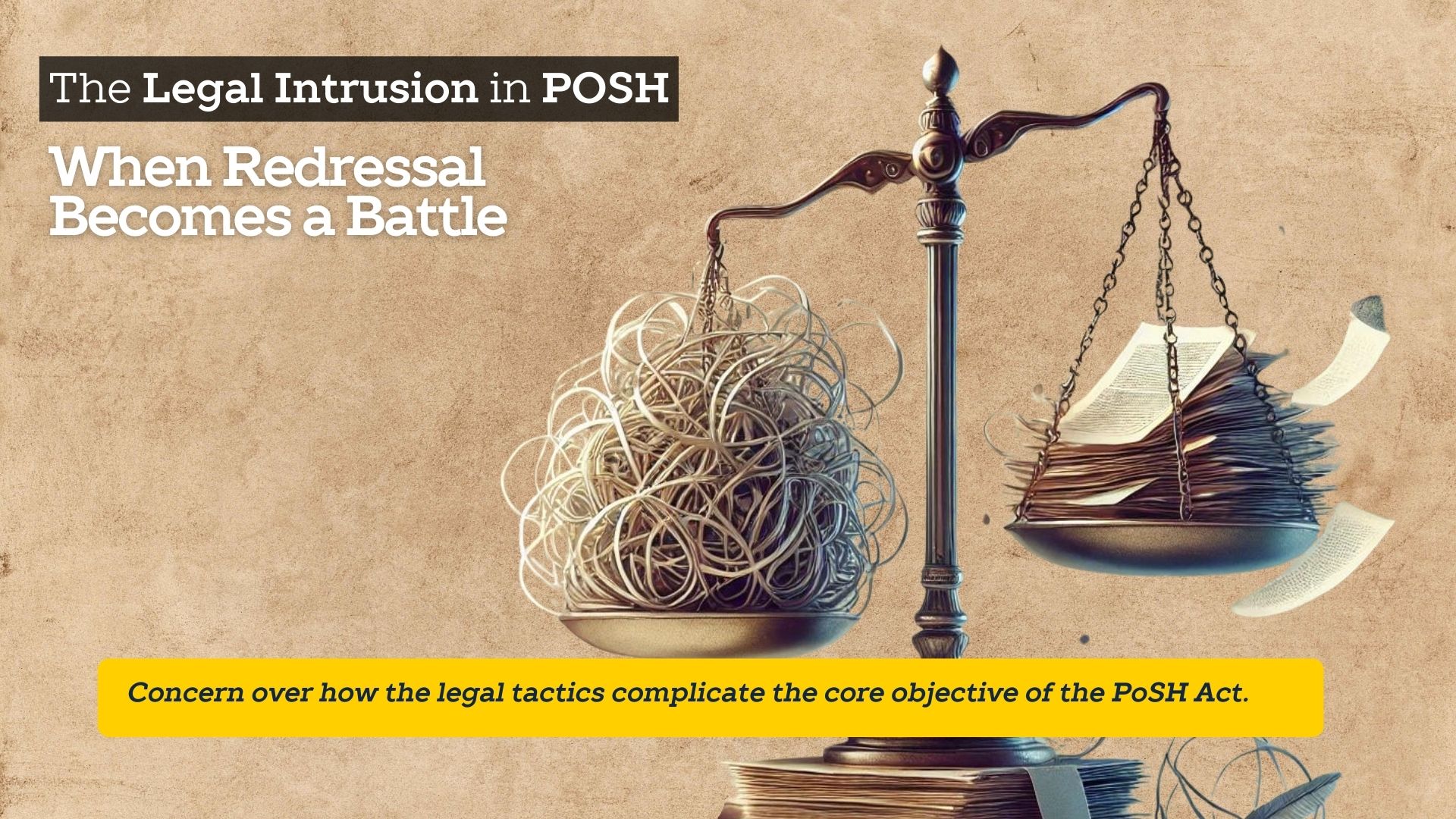This morning, as I sat on the terrace with my beagle beside me, we both admired the lush green surroundings after an overnight rain. Sipping my favorite black coffee from the estates of Chikmagalur, I began drafting a response for one of the Respondents in a POSH compliance case.
The case in question involved a 10-page reply written by an advocate, meticulously printed on the official letterhead of a law firm. The reply was laden with technical legal jargon—phrases like “based entirely on conjecture,” references to Articles 14 and 21 of the Constitution, citations of judgments like Poonam Bansal v. State of Haryana and Ors, legal maxims, and much more. As if by script, this response arrived on the very last day of the 10-working-day deadline, a trend I’ve noticed in recent times. The closing line, almost predictably, carried a subtle warning: “My client will be left with no option but to invoke the jurisdiction of the Honorable Court.”
I couldn’t help but wonder: Is this an attempt to intimidate the Internal Committee (IC) members? After all, many of them are not from a legal background and juggle their full-time jobs alongside their responsibilities as IC members. The POSH Act is designed to be a straightforward, quick redressal mechanism, yet these legal responses attempt to transform it into something akin to a criminal proceeding. The Act explicitly states that legal representation is not allowed in POSH inquiries, yet some legal professionals seem to be advising this approach to their clients. And, with no offense intended, I suspect that in many cases, this is paid advice.
But what saddens me most is the impact on the Respondent. In most cases, the IC will not entertain a response from a third party, particularly from a legal professional. By taking this route, the Respondent often loses the golden period of 10 working days, a critical time to gather evidence, present a defense, and address the allegations head-on. Instead, the energy is spent nitpicking the IC’s words, searching for procedural lapses, or attempting to intimidate the IC with a barrage of legal citations—efforts that could have been better spent on crafting a substantive defense against the complaint.
This trend leaves me with many questions.
Are Respondents being misguided?
Is this approach a defense mechanism, triggered by the fear of receiving an IC notice?
Is the hope to overwhelm the IC with legal weight, to scare them off, rooted in the absence of a solid defense?
The POSH Act is designed to be a simple redressal mechanism, grounded in the principles of natural justice, but deliberately kept away from the complicated labyrinth of legal proceedings. It’s a system intended to provide swift and fair resolutions, not to bog down in legal technicalities.
This brings to light the pressing need for POSH training within organizations. Employees must be aware that the POSH Act is not about legal battles but about creating safe workplaces. At the same time, IC members must be well-trained to handle such situations, ensuring that investigations are not derailed by “threats in the name of defense.” This is precisely why it is crucial to have a suitable and active external member on board—someone who can provide guidance and a way forward in such scenarios.
Ultimately, the POSH Act is a tool for justice, designed to protect the vulnerable and ensure fairness. Turning it into a legal battleground not only undermines its purpose but also jeopardizes the very principle of natural justice it was built upon. The goal should always be to seek the truth, address grievances, and foster a culture of respect and dignity in the workplace. Anything else, including these emerging legal tactics, only serves to obscure that goal.
It’s time for us to reflect on this trend and consider its implications. Are we complicating a process that was meant to be straightforward? Are we allowing fear to dictate our actions, rather than trusting the system that was put in place to ensure fairness? And most importantly, are we truly serving the cause of justice, or merely getting lost in the mechanics of defense?
As I finish my coffee, I can’t help but feel that the answers to these questions lie in how we choose to navigate the POSH Act. Let’s strive to keep it simple, just, and focused on what truly matters: the safety and dignity of every individual in the workplace.

Demystifying the Supreme Court’s POSH Act 2013 Directives
The Supreme Court of India has recently issued crucial directives concerning the Prevention of Sexual Harassment (POSH) Act 2013, providing directions for organizations and professionals alike. To help you unlock the full potential of these directives, we’ve created an easily understandable and accessible document that breaks down complex legal jargon into clear, actionable steps.





One Comment
Thank you for this well written blog.
I came across this accidentally and I completely agree with what you mention here. Being an external POSH Consultant myself I am seeing this happen. It troubles me as well that something simple and swift is suddenly becoming complicated with the IC actually becoming paranoid that they will make some mistake and the case will end up in an appeal court on one hand and worrying that they may antagonize the management in some way. It doesn’t have to be so complicated. IC in reality is playing a profound role in restorative practices so to speak, by following natural justice and giving the parties a chance to talk it out as well. Somehow that gets lost in the whole process in some organizations.